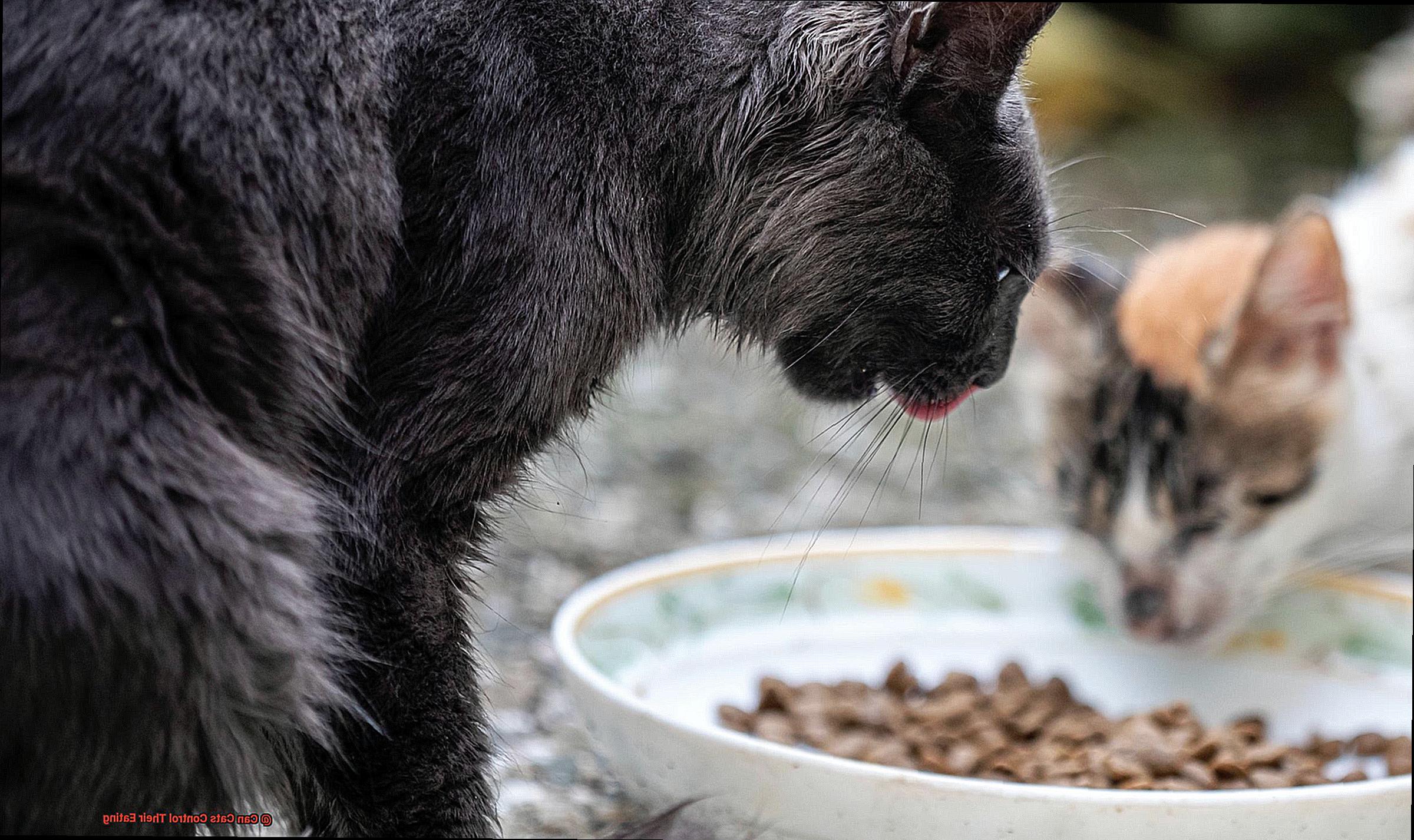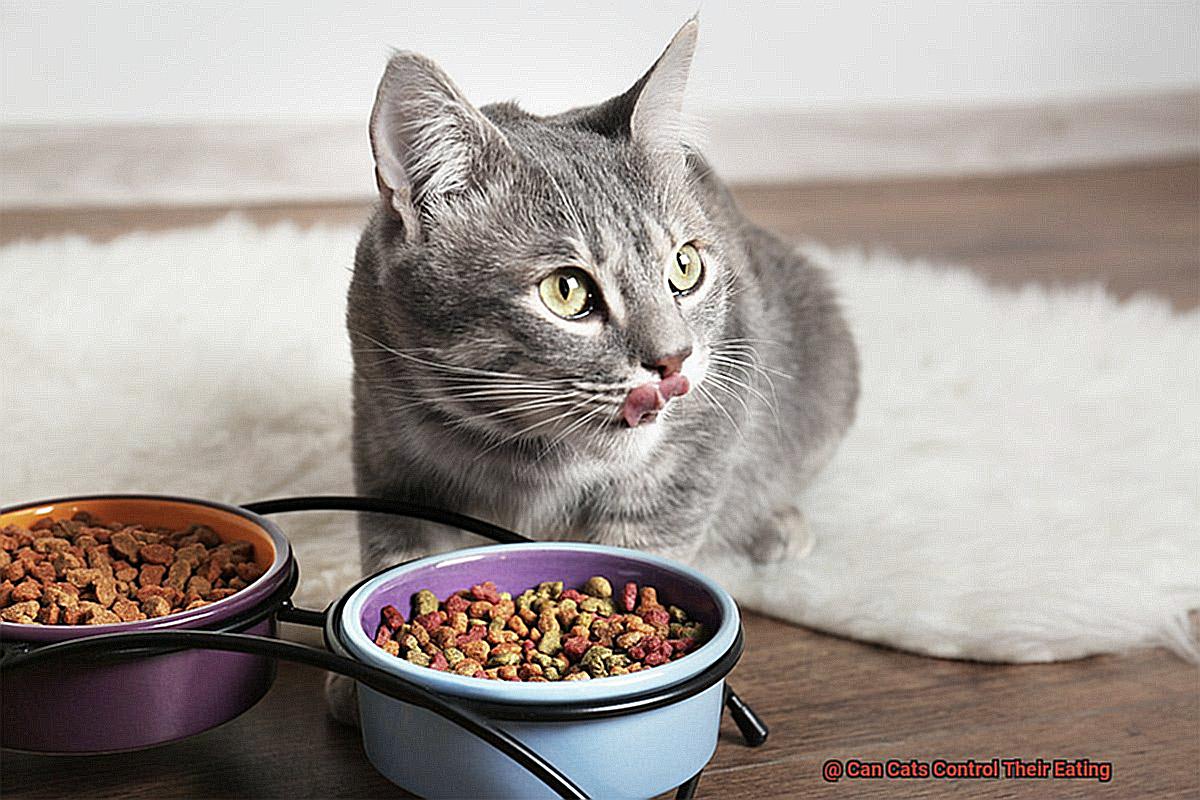Do cats have the power to regulate their eating? It’s a valid question that many pet owners ask. After all, cats are known for being picky eaters and can be difficult to please when it comes to food. But do cats really have the ability to control how much they eat?
The answer is yes. Cats are in fact quite capable of managing their own food intake. Although certain factors like age, illness, and stress levels can affect a cat’s appetite, cats have the power to decide when they’re hungry or full.
So how do cats control their eating habits? Well, it starts with understanding what motivates them to eat in the first place. Two primary factors are smell and taste – if something smells or tastes good to them, they’ll be more likely to eat it. On the other hand, if something doesn’t smell or taste good, they’ll avoid it completely.
Cats also possess a strong sense of self-control when it comes to food – they know when they’ve had enough and won’t keep eating until they feel full. This helps prevent overeating which can lead to obesity and other health issues in cats. Pet owners must learn how to recognize these signals from their cats so that they can adjust their feeding schedule accordingly.
In conclusion, cats have the capability to limit how much food they consume by relying on both instinctive and learned behaviors. Pet owners can help ensure that their cats stay healthy while still enjoying all the delicious treats life has to offer by understanding what motivates them and recognizing signs of fullness.
The Natural Instincts of Cats
Cats are mysterious creatures, and it can be difficult to understand their behavior. But if you take a closer look at their natural instincts, you’ll get a better idea of why they act the way they do.
When it comes to eating habits, cats have an instinctive desire to eat when hungry. This is because of their ancestors who had to hunt for food in order to survive. As a result, cats have retained this behavior and will actively seek out food when they smell it.
However, overeating can also be attributed to instinctual habits. In the wild, cats would consume as much food as possible due to food scarcity. This behavior carries over into domesticated life, resulting in weight gain and related health issues.
Pet owners can manage their cat’s feeding habits by recognizing and addressing these behaviors. Setting specific times for feeding your cat and providing them with mental stimulation and physical exercise can help prevent them from overeating.
Environmental Factors that Contribute to Overeating in Cats

Cats are intelligent and curious creatures, but their instincts can lead to overeating if the right environmental factors are in place. Fortunately, as responsible pet owners, we can recognize these factors and take steps to ensure our cats lead a healthy and happy life.
One of the major causes of overeating in cats is free feeding. This is when a bowl of food is left out all day for your cat to eat as much as they please. This can lead to overeating because it becomes impossible to track how much your cat is eating. Additionally, free feeding may cause food boredom, which will cause your cat to eat more than necessary.
Another factor that contributes to overeating in cats is feeding them an inappropriately sized meal. Feeding your cat a large meal will cause them to overeat and become overweight, while giving them a small meal will leave them feeling hungry and cause them to overeat later.
In addition, cats need a quiet and stress-free environment in order to properly digest food; so feeding them in a crowded or noisy area can cause them to eat too quickly, making it impossible for them to stop when they are full.
Regular exercise is also essential for cats in order for them to maintain a healthy weight and avoid overeating due to boredom or hunger pains.
The Impact of Feeding Schedules on Eating Habits
Having a consistent feeding schedule is critical for maintaining your cat’s healthy eating habits. Cats are natural hunters, so they prefer to have small, frequent meals throughout the day rather than one large meal.
It’s important to choose the right kind of food – dry food is generally more convenient since it can be left out for a longer period without spoiling. However, if you prefer wet food, make sure it isn’t left outside for more than thirty minutes as it can attract insects and other unwanted animals.
By sticking to a regular feeding routine, you can help your cat learn when to expect their food and reduce the likelihood of them overeating. This can prevent problems such as obesity, indigestion, and other health issues.

Boredom and Its Role in Overeating in Cats
Cats are natural hunters, and when they don’t have the opportunity to channel their hunting instincts, they can become bored and prone to overeating. Boredom can lead to cats seeking out food as a source of entertainment, resulting in weight gain and other health issues.
It’s essential for responsible cat owners to provide our feline friends with mental and physical stimulation. This can be done by providing toys that mimic hunting behavior, such as those that promote pouncing or problem-solving skills.
Regular playtime is also important – interactive toys, puzzle feeders, and treats hidden throughout the house are all great ways to keep cats entertained.
In addition to environmental enrichment, it’s important to monitor your cat’s food intake and feeding habits. Avoid free-feeding as this can lead to overeating and obesity; instead follow a strict feeding schedule and only offer the amount of food recommended for your cat’s age, weight, and activity level.
Signs of Overeating in Cats
Overeating in cats can be a serious health concern, leading to obesity, diabetes, and even gastrointestinal issues. As responsible pet owners, it’s important to recognize the signs of overeating in our feline friends and take steps before any serious consequences occur.
Weight gain
One of the most obvious signs of overeating in cats is weight gain. If your cat has suddenly gained a few pounds, it could be that they’re consuming more calories than they’re burning. This can lead to obesity and other health problems such as joint pains, breathing difficulties, and even a shorter lifespan over time.
Vomiting or regurgitation
Vomiting or regurgitation is another common sign of overeating in cats. When a cat eats too much or too quickly, their digestive system can become overloaded, leading to vomiting or diarrhea. If left untreated, this can result in dehydration and malnourishment.
Other Signs
In addition to weight gain and vomiting, there are other signs of overeating in cats that may include lethargy, decreased activity levels, and even behavioral changes. Cats who are eating too much food may become lazy or uninterested in play or exercise, as well as irritable or aggressive due to their discomfort or frustration.
It’s essential for cat owners to remain vigilant when it comes to their pet’s eating habits and take action if they notice any signs of overeating or other health concerns.
Health Consequences of Overeating in Cats
Overeating can have serious consequences for cats, leading to a range of health issues that can seriously impact their quality of life.
Diabetes mellitus, joint pains, respiratory difficulties, and even heart disease are all potential risks associated with overeating in cats. In addition, cats may suffer from vomiting or diarrhea due to overeating; both of which can result in dehydration and malnutrition.
Furthermore, long-term overeating may lead to gastrointestinal problems such as constipation, pancreatitis, and liver disease – the latter of which can be fatal in some cases.
It is essential for cat owners to keep a close eye on their pet’s eating habits and ensure they receive a balanced and nutritious diet.
To prevent health problems caused by overeating, it is important to divide meals into smaller portions and avoid leaving food unattended for extended periods.
If your cat is already suffering from obesity or other health issues due to overeating, please consult with a veterinarian and follow the prescribed diet and exercise plan to manage their weight and health.
In conclusion, cats rely on us as responsible pet owners to regulate their diets and ensure they are healthy and happy.
Ways to Help Your Cat Control Its Eating Habits
Overeating can lead to obesity and a variety of health issues, so it’s important to ensure they don’t consume too much food. Fortunately, there are several simple strategies you can use to help your cat control its eating habits.
Start by measuring out your cat’s daily food portions; feed them 3-4 small meals rather than leaving them with an open bowl of food.
Incorporate food-dispensing toys or puzzles into their mealtime routine to slow down their eating speed and give them time to feel fuller before consuming more food. Slow feeder bowls are also ideal for encouraging slower eating and avoiding overeating.
It’s also important to avoid feeding your cat human food and limit the number of treats you give them. Too many treats can lead to unhealthy weight gain, so bear this in mind when rewarding your feline friend with snacks.
Make sure they have ample opportunities for exercise and playtime; this will help them burn off excess calories and maintain a healthy weight.
If you’re having trouble managing your cat’s eating habits, consult with a veterinarian.
Conclusion
Cats can be mysterious, but with the right knowledge and tactics, cat owners can ensure their feline friends live a healthy and happy life. To provide cats with a balanced diet, it’s essential to offer high-quality protein and low amounts of carbohydrates in small portions throughout the day. Additionally, toys and playtime activities should be available to keep cats mentally stimulated and physically fit.
It’s important to recognize the signs of overeating in cats such as weight gain, vomiting or regurgitation, lethargy, reduced activity levels, and behavioral changes. If you notice any of these signs in your cat, please consult your veterinarian for advice on how to manage their diet and wellbeing.







